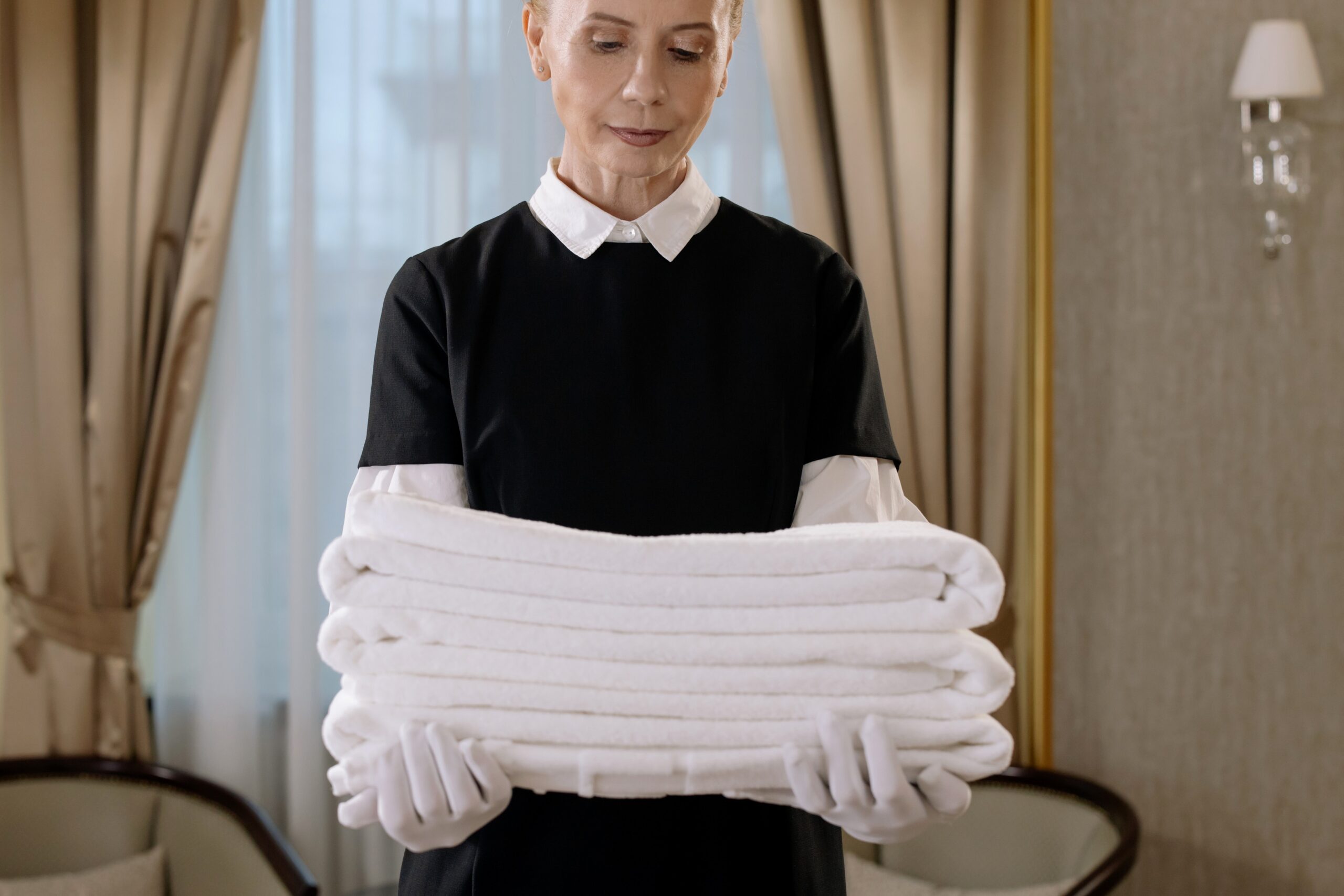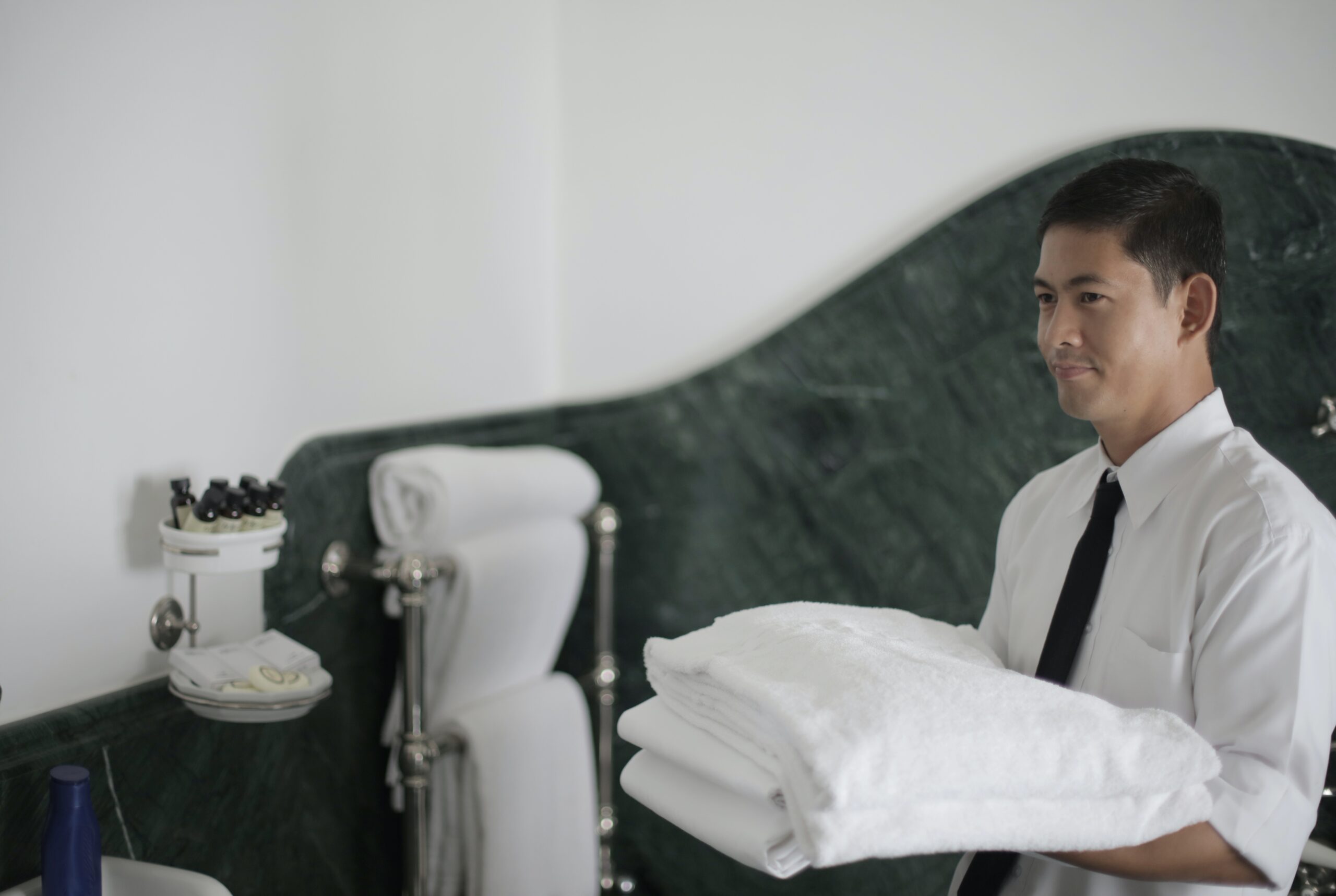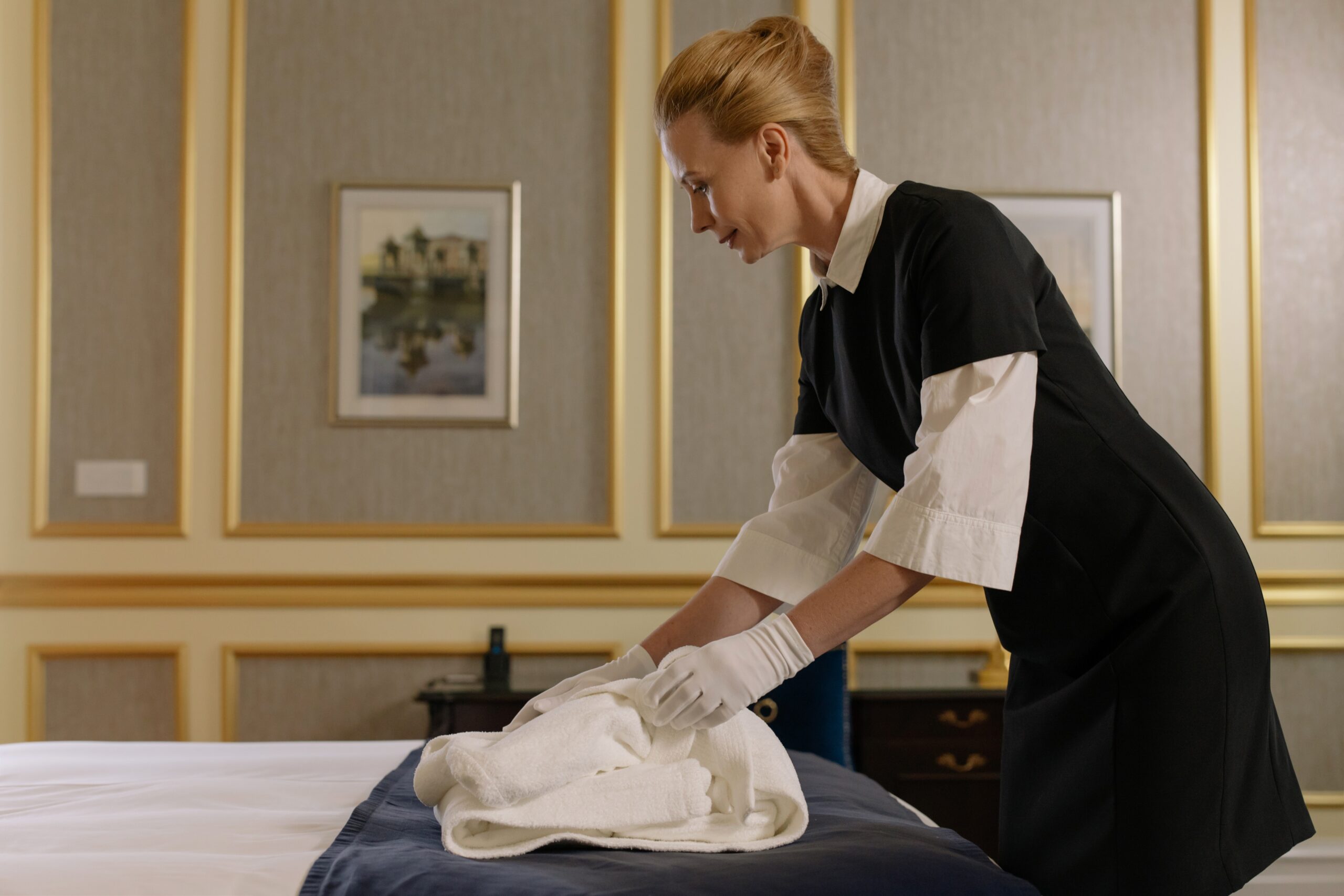Why Are Cleaning Services Mandatory in Hotels

The significance of hotel cleaning services in the fiercely competitive hospitality industry cannot be overstated. These services are critical to defining the guest’s experience, enhancing the hotel’s reputation, and, ultimately, ensuring the hotel’s success. This article explains why are cleaning service mandatory in hotels.
Cleanliness and hygiene are critical in the hospitality industry, particularly in hotels. They are the unseen but visible representatives of quality service, frequently forming the first impression and setting the tone for the entire stay. Hotel guests have a non-negotiable expectation of cleanliness, which they frequently associate with a hotel’s commitment to customer service.
A well-kept and immaculately clean hotel encourages guests to stay longer, influencing their decision to return and the likelihood of recommending the hotel to others.
In this essay, we will look at why hotel cleaning services are necessary. We will examine how cleanliness affects customer satisfaction and loyalty, how cleaning services help maintain the hotel’s brand image, and how cleanliness affects health and safety.
Furthermore, we will examine how cleaning services have evolved in an era of increased environmental awareness and an ongoing global pandemic, where hygiene and sanitation have become industry priorities. The indisputable importance of hotel cleaning services will become clear at the end of this discussion.
The Connection Between Cleanliness and Guest Satisfaction

Cleanliness is an important factor in determining guest satisfaction in hotels. It not only shapes guests’ initial perceptions but also has a long-term impact on their perceptions. The cleanliness of a hotel’s lobby, guest rooms, and public areas demonstrates its attention to detail and commitment to the comfort of its guests.
This cleanliness directly impacts guest reviews and ratings, critical in attracting new customers in the digital age.
Guest room cleaning is essential in personal spaces where comfort and cleanliness are paramount. The cleanliness of public areas, such as lobbies and swimming pools, influences the ambiance. In contrast, dining establishment hygiene is directly related to guests’ health, influencing their experience and the hotel’s reputation.
Inadequate cleanliness can lead to negative reviews, deterring potential guests. As a result, maintaining high standards of cleanliness is not a luxury for hotels but rather a necessity for ensuring guest satisfaction and a competitive position.
Online Reviews and Reputation
Online reviews significantly influence a hotel’s reputation, with cleanliness being the most important factor. Platforms such as TripAdvisor and Google Reviews are important in influencing prospective guests’ booking decisions, making them influential in the hospitality industry. Understanding the ramifications of a single negative review, especially in the digital age, is critical.
Negative feedback has the potential to spread quickly and widely, causing significant brand damage to the hotel. A strict cleanliness protocol is important for maintaining the physical environment and protecting the hotel’s online reputation and, by extension, its market position.
Furthermore, hotels must think about long-term customer relationships. A guest’s dissatisfaction with the hotel’s cleanliness may result in a negative review and a loss of loyalty. It may deter them from returning or recommending the hotel to others.
On the other hand, a hotel that consistently maintains high standards of cleanliness can foster trust and loyalty among its guests, resulting in positive reviews and referrals that strengthen its reputation over time.
Guest Retention
The cleanliness of a hotel heavily influences guests’ decision to return. A positive experience can increase customer loyalty, resulting in repeat bookings and a higher lifetime value per guest. Conversely, poor cleanliness can deter customers from returning, resulting in significant revenue loss over time.
A clean and well-kept hotel is more likely to receive positive word of mouth, increasing bookings. Negative experiences with cleanliness, on the other hand, have the potential to spread and deter prospective guests.
As a result, maintaining impeccable cleanliness ensures guest satisfaction and repeat business and avoids potential revenue loss and reputation damage.
First Impressions
The cleanliness of a hotel is critical in determining how guests perceive the establishment at first. Clean and well-organized public areas, such as lobbies, hallways, and elevators, set a positive tone upon entry, signaling a well-maintained and professional establishment. This first impression frequently influences guests’ comfort and enjoyment during their stay.
Clean surroundings provide a pleasant, sanitary environment and demonstrate care and attention to detail.
As a result, this level of comfort allows guests to unwind, enjoy their stay, and focus on the purpose of their visit, whether for business, pleasure, or a combination of the two.
Dining Establishments
Hotel dining areas, including restaurants, bars, and other establishments, must be spotless. Unsanitary dining areas can pose serious health risks, leading to foodborne illnesses that can harm a hotel’s reputation and result in legal ramifications.
Professional cleaning services are essential for maintaining high cleanliness standards in these areas. Their knowledge and experience ensure thorough cleaning and sanitation, preventing contamination and providing a safe and aesthetically pleasing dining experience.
As a result, investing in professional cleaning services is critical to protect guests’ health, ensure their satisfaction, and maintain the hotel’s reputation.
Aesthetics and Functionality
Choosing easy-to-clean materials and furniture for guest rooms and public areas is important to hotel cleanliness. Design and layout decisions can significantly impact how easily keeping a space clean is. Using stain-resistant fabrics, nonporous surfaces, and resilient flooring, for example, can make cleaning easier and help preserve the appearance over time.
Consulting with a professional cleaning service during the planning and design phases can provide valuable insight into creating attractive, easy-clean spaces. This proactive approach ensures practical and sustainable cleanliness standards, resulting in lower maintenance costs, higher guest satisfaction, and a higher-quality overall stay.
Regulatory Compliance and Health Standards

Hotels must follow strict legal and health regulations regarding cleanliness. To ensure the safety and comfort of guests, these standards include requirements for waste disposal, food safety, and sanitation practices.
Failure to comply may result in fines, lawsuits, negative publicity, and, in extreme cases, the loss of a license or the closure of a business. In addition to these legal consequences, noncompliance can cause significant reputational harm, decreasing clientele and income.
As a result, hotel cleanliness regulations are not only a legal requirement but also an essential component of their operational success and reputation management.
Local and International Health Standards
Hotels must follow several local and international health standards, including CDC guidelines, World Health Organization (WHO) recommendations, and local health department regulations. These regulations cover various topics, including food handling, sanitation, and waste management.
Hotels must adapt as these standards are revised regularly to reflect new research findings and evolving health threats.
This continuous compliance is important for more than just meeting legal requirements; it is also important for ensuring guest safety and trust, which are critical to any hotel’s success in the hospitality industry.
The Role of Cleaning Services in Preventing Health Hazards
Cleaning services are critical in preventing allergens, bacteria, and viruses from posing a health risk in hotels. Thorough cleaning, such as dusting, vacuuming, and disinfecting, aids in the removal of allergens that can cause respiratory problems and allergic reactions in visitors.
Effective cleaning practices and removing bacteria and viruses reduce the risk of infection and promote a healthy environment—furthermore, routine cleaning and maintenance help to keep pests like bed bugs and rodents at bay. Rapid detection and eradication of such infestations protect guest health and prevent a hotel’s reputation from suffering.
Specialized Cleaning Procedures
Professional cleaning services employ specialized techniques to ensure a thorough and efficient cleaning. Steam cleaning, which uses high-temperature steam to sanitize and disinfect surfaces, is one of these techniques. HEPA vacuuming is another method that uses high-efficiency particulate air filters to capture fine particles and allergens, improving indoor air quality.
Hiring professional cleaning services has numerous benefits. First and foremost, they have the knowledge and expertise to use the appropriate cleaning techniques and products for various hotel surfaces and areas.
This ensures effective cleaning while causing minimal damage to delicate materials. Professional cleaners are also trained in effective time management, allowing them to complete tasks quickly and without disturbing guests. Their attention to detail and adherence to industry standards ensure the hotel is consistently clean, increasing guest satisfaction and promoting a positive reputation.
The Competitive Advantage of a Clean Hotel

A well-maintained and clean hotel provides a competitive advantage in the hospitality industry. It boosts the hotel’s brand reputation and lays the groundwork for a positive guest experience. Hotels that consistently maintain high cleanliness standards can distinguish themselves from the competition.
Positive word-of-mouth and online reviews from pleased customers help to attract repeat customers, foster customer loyalty, and gain a competitive advantage.
In recent years, the hotel industry has prioritized environmentally friendly practices. Guests are becoming more conscious of environmental issues and expect hotels to demonstrate their environmental commitment. This includes using environmentally friendly cleaning methods.
Commercial cleaning services are critical in assisting hotels in making the transition to greener practices. They can recommend and implement environmentally friendly cleaning materials and methods, such as using non-toxic and biodegradable cleaning agents, reducing water and energy consumption, and implementing recycling programs.
These initiatives meet guests’ expectations and contribute to the hotel’s overall sustainability goals and positive environmental impact. Hotels can adopt and promote environmentally friendly practices more effectively by partnering with commercial cleaning services.
The Essential Elements of a Comprehensive Cleaning Plan
An effective hotel cleaning plan comprises regular cleaning tasks, such as daily housekeeping service and maintenance, and scheduled deep cleaning to address hard-to-reach areas. Specialized services, like carpet or upholstery cleaning, may be required periodically.
Additionally, a well-prepared plan includes an emergency response protocol to swiftly handle unexpected situations, such as spills or accidents, ensuring a clean hotel room and safe environment for guests.
Collaborating with a Professional Cleaning Service
Partnering with a reputable commercial cleaning service offers several advantages for hotels in maintaining consistent cleanliness and hygiene:
- Expertise and Experience: A reputable commercial cleaning service with extensive knowledge and experience in professional cleaning techniques. They are well-versed in hotel cleaning requirements and challenges, ensuring thorough and efficient cleaning procedures.
- Consistent Standards: With a commercial cleaning service, hotels can expect consistent cleanliness standards across all areas. These individuals have been trained to follow industry standards, ensuring high cleanliness in the hotel’s guest rooms, public areas, dining establishments, and other areas.
- Time and Resource Savings: By outsourcing cleaning duties to a commercial service, hotel staff can devote more time and resources to other core operational duties. The cleaning service handles all cleaning-related responsibilities, including personnel, supplies, and equipment, relieving the hotel of the administrative burdens associated with these responsibilities.
- Customized Cleaning Solutions: Respectable commercial cleaning services understand that each hotel has unique cleaning needs. They can tailor their services to meet specific requirements, ensuring a cleaning schedule tailored to the hotel’s standards and preferences.
- Flexibility and Scalability: Commercial cleaning services are frequently equipped to meet the diverse needs of hotels, such as adjusting cleaning frequency based on occupancy levels or providing additional staff during peak seasons. This adaptability and scalability allow hotels to maintain consistently high cleanliness standards.
- Compliance with Regulations: Commercial cleaning services follow local health regulations, ensuring the hotel maintains its cleanliness and hygiene standards. This helps to mitigate any risks or penalties associated with noncompliance.
Cleanliness: The Key to a Successful Hotel Experience
Cleaning services are more than necessary in the competitive world of hospitality; they are critical to the success of any hotel. There is a direct link between cleanliness and guest satisfaction, online reviews, and a hotel’s reputation. Cleanliness sets the tone for a pleasant stay, from the first impression to the guest rooms, public areas, and dining establishments.
Noncompliance with cleanliness standards may result in legal consequences, negative publicity, and revenue loss. Specialized cleaning procedures, adherence to health regulations, and environmentally friendly practices are all required. Collaboration with a reputable commercial cleaning service ensures consistency in cleanliness, expertise, time savings, and customized solutions.
Maintenance One understands the importance of upholding impeccable hotel cleanliness standards. Our experienced staff provides hotel cleaning services tailored to each establishment’s needs. Maintenance One has a stronghold and practice on hotel room cleaning policy.
We assist hotels in achieving and maintaining a clean and sanitary environment through our knowledge, attention to detail, and dedication to customer service. Contact us immediately to learn how our services can benefit your hotel and ensure a positive guest experience.


